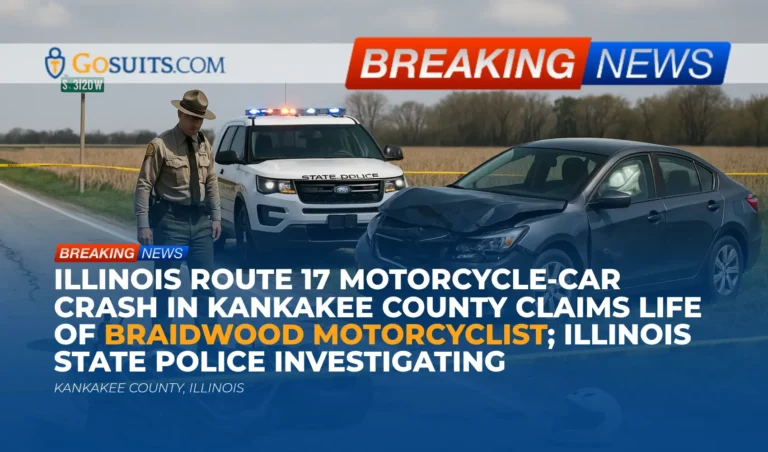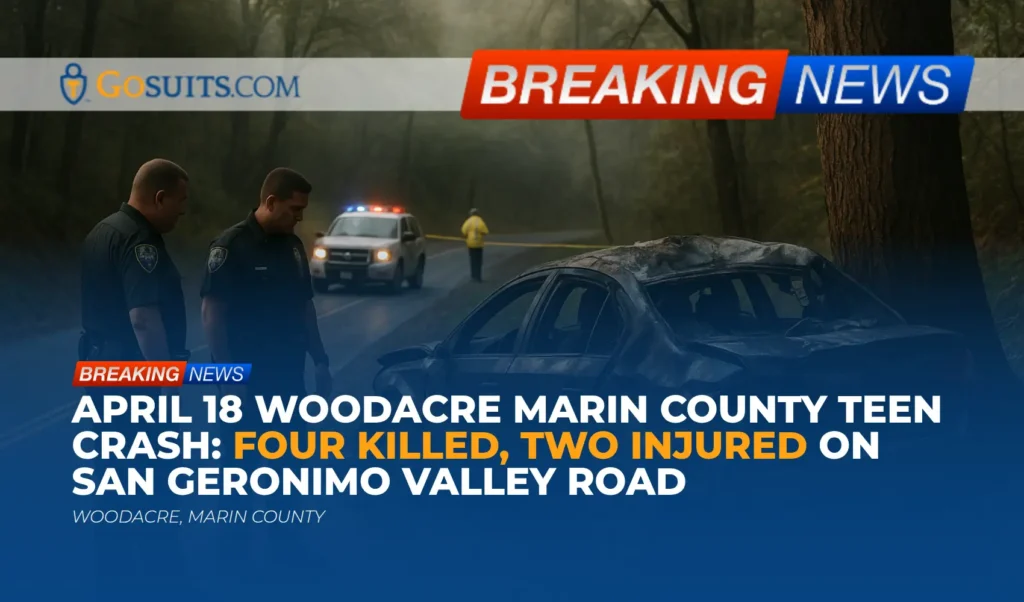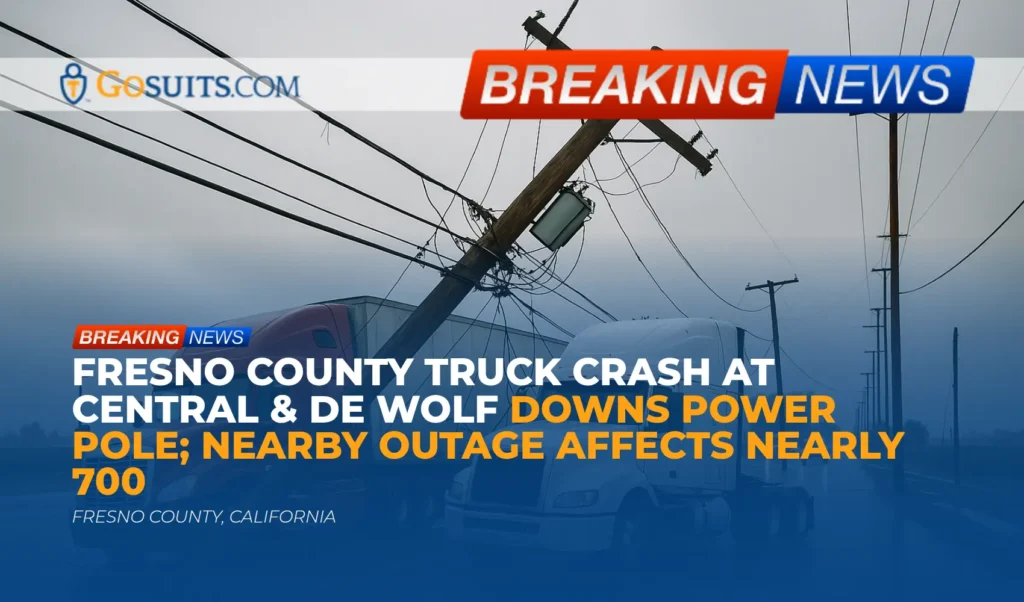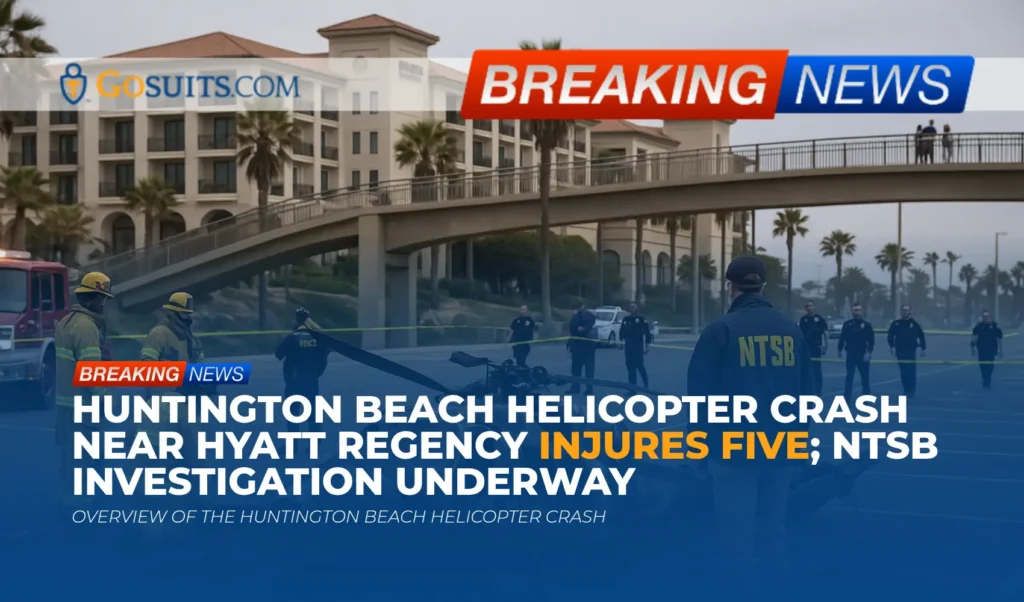- What we know about the crash on Illinois Route 17 in Kankakee County
- Location, timing, and investigatory status
- Immediate steps families commonly take after a fatal roadway crash
- How to obtain official records in Illinois
- Illinois State Police crash report and investigative materials
- Coroner records, autopsy, inquest, and death certificates
- Towing, vehicle inspections, and preservation
- Wrongful death and survival actions
- Comparative negligence and why early evidence matters
- Insurance coverages that may apply
- Motorcycle safety and crash trends in Illinois
- Common liability issues in motorcycle and passenger car collisions
- Respectful communication with insurers
- Where to find support and information locally
- Commentary from Gosuits Kankakee County, Illinois Personal Injury Attorney
- Why timely action matters now
What we know about the crash on Illinois Route 17 in Kankakee County
Authorities have publicly identified the motorcyclist who died in a collision involving a motorcycle and a passenger car on Illinois Route 17, west of Kankakee. According to officials, a 31-year-old from Braidwood was operating the motorcycle and was pronounced deceased at the scene later that morning after first responders arrived. The crash prompted a temporary closure of Illinois Route 17 in the area while the Illinois State Police conducted their on-scene investigation. At this time, state police have not released additional details about the sequence of events or preliminary findings, and the investigation remains active. Our hearts are with the family and all those affected.
Location, timing, and investigatory status
The incident occurred on a Sunday morning at approximately 9:49 a.m. on Illinois Route 17 at South 3120W Road, west of Kankakee. The roadway was closed until about 2 p.m. while investigators worked. The Kankakee County Coroner’s Office later confirmed the death and notified next of kin. Illinois State Police Troop 5 responded and are the primary investigating agency. No further official narrative about fault or causation has been made public as of this writing.
In crashes like this, it is typical for investigators to document the scene, gather witness statements, analyze vehicle positions and damage, and, where available, review dashcam or nearby surveillance footage. Depending on the complexity, specialized reconstruction may be performed. Families should expect an initial period where limited information is available while law enforcement confirms facts.
Immediate steps families commonly take after a fatal roadway crash
In the early days following a fatal crash, there are practical and administrative needs that can feel overwhelming. The list below is general information to help orient families to common tasks; it is not exhaustive and not a substitute for legal counsel.
- Coordinate with authorities and confirm points of contact. Identify the lead investigator with the Illinois State Police and a contact at the Kankakee County Coroner’s Office to receive updates about the investigation and inquest process.
- Protect personal effects and the motorcycle. Determine the tow yard or storage facility holding the motorcycle and any belongings. Ask that the motorcycle be preserved in its post-crash condition for inspection and do not authorize disposal before speaking with an attorney.
- Collect and organize documents. Keep a file with any incident numbers, insurance information, towing receipts, and communications. This can reduce delays when requesting records or making claims.
- Identify potential witnesses. If anyone witnessed the crash or its aftermath, write down names and contact information. Time can make locating witnesses harder.
- Consider compassionate, informed guidance. Speaking with a seasoned and skilled personal injury attorney early can help families understand rights, timelines, and the types of insurance or benefits that may be in play.
How to obtain official records in Illinois
Accessing official records helps families understand what happened and is often necessary to pursue insurance claims or civil actions. Each record type has its own process and timeline.
Illinois State Police crash report and investigative materials
The investigating agency for this crash is the Illinois State Police (ISP), Troop 5. Basic crash reports are typically available after they are approved and finalized. More detailed materials such as diagrams, photos, measurements, and supplemental narratives may take longer and may be subject to exemptions while the investigation is pending.
- Requesting reports. The ISP provides guidance on obtaining records and submitting Freedom of Information Act requests through its website. See the ISP FOIA page at https://isp.illinois.gov/FOIA. For general information about Troops, visit https://isp.illinois.gov.
- FOIA framework. FOIA is a state law that allows access to public records with certain exemptions, including for ongoing investigations. The Illinois FOIA statute is available at the Illinois General Assembly’s site: https://www.ilga.gov/legislation/ilcs/ilcs3.asp?ActID=85&ChapterID=2.
- Crash report number. Ask the responding agency for the crash report number. This number speeds up any requests and helps ensure you receive the correct record.
Coroner records, autopsy, inquest, and death certificates
The Kankakee County Coroner’s Office confirmed the death in this incident. Coroners may conduct autopsies and hold inquests depending on the circumstances. Certain records may be available to next of kin, while other materials may be limited by law or pending investigations.
- Death certificates. Certified death certificates are issued through the Illinois Department of Public Health’s Division of Vital Records. Guidance on obtaining death records is provided by IDPH at https://dph.illinois.gov/topics-services/birth-death-other-records.html.
- Coroner’s reports and inquest findings. Once available, these can be requested from the county coroner. Availability and scope may be affected by ongoing investigations and FOIA exemptions. Families can ask the coroner’s office when an inquest is scheduled and how to request the final report.
- Autopsy and toxicology timelines. Toxicology testing can take weeks. Ask the coroner’s office for expected timeframes and processes for releasing results to next of kin.
Towing, vehicle inspections, and preservation
The motorcycle and the passenger car may hold critical evidence, including impact points, lighting filament condition, brake system status, and event data recorder information from the car. Preserving vehicles in their post-crash condition helps engineers and reconstructionists analyze what happened.
- Locate the vehicles. Confirm where the motorcycle and car are stored. Keep towing and storage paperwork.
- Preservation requests. A written preservation request can ask owners and storage facilities not to repair, alter, or dispose of the vehicles without prior notice. An attorney can help issue preservation notices to involved parties and their insurers.
- Inspection coordination. If an inspection is needed, coordinate with the storage facility and the involved insurers to schedule a joint inspection to document the vehicles and avoid claims of spoliation.
Legal context and victim rights in Illinois
Illinois law provides pathways for families to seek civil accountability after a fatal crash. The specifics depend on facts that are not yet public, so the comments below are general.
Wrongful death and survival actions
Illinois recognizes two distinct but often related civil claims after a fatal injury.
- Wrongful death claim. This claim seeks damages for the losses suffered by the surviving next of kin due to the death, such as loss of companionship and support. The Illinois Wrongful Death Act is at 740 ILCS 180, available at https://www.ilga.gov/legislation/ilcs/ilcs3.asp?ActID=2031&ChapterID=56. The statute generally provides a limitations period of two years from the date of death, with some exceptions set out in the law.
- Survival action. Separately, the estate may recover for harms the person suffered between injury and death, such as conscious pain and suffering and medical expenses. See 755 ILCS 5/27‑6 at https://www.ilga.gov/legislation/ilcs/fulltext.asp?DocName=075500050K27-6.
These claims are typically brought by a court-appointed representative of the estate. The timing, beneficiaries, and distribution are governed by statute and, in some cases, by the probate court’s oversight.
Comparative negligence and why early evidence matters
Illinois follows a modified comparative negligence framework. Under 735 ILCS 5/2‑1116, recovery is reduced by the percentage of fault assigned to the plaintiff and barred if that fault exceeds 50 percent. The statute is available at https://www.ilga.gov/legislation/ilcs/fulltext.asp?DocName=073500050K2-1116.
Because of this, timely evidence collection can be critical. Skid marks, debris fields, lighting conditions, sight lines, traffic volumes, and vehicle damage patterns can inform a reconstruction of who had the right-of-way, whether a turn or lane change was made safely, and whether speeds were reasonable for conditions. Early preservation reduces the chance that vital details are lost.
Insurance coverages that may apply
Multiple insurance policies can be implicated in a motorcycle and passenger car collision. While each policy differs, typical coverages include:
- At-fault driver’s liability coverage. Illinois requires minimum liability coverage for drivers, set by state law and administered through the Secretary of State. General information on driver requirements and safety resources is available through the Illinois Secretary of State at https://www.ilsos.gov/departments/drivers/drivers_license/publications.html.
- Uninsured/underinsured motorist coverage. A motorcyclist’s own policy may include UM or UIM coverage that applies if the at-fault driver is uninsured or lacks sufficient limits.
- Medical payments coverage. Some policies include med-pay to help with immediate expenses, subject to policy terms.
- Potential claims involving public entities. Where roadway design, signage, or maintenance is raised, claims may involve public bodies. Such claims are subject to the Illinois Local Governmental and Governmental Employees Tort Immunity Act, 745 ILCS 10, available at https://www.ilga.gov/legislation/ilcs/ilcs3.asp?ActID=2069&ChapterID=57. These matters have specialized notice and immunity considerations.
Before speaking to any insurer, including your own, it is prudent to consult an attorney. What is said to an insurance adjuster can be recorded and may be used to limit recovery later. A free consultation can help clarify rights and next steps before any statements are made.

Evidence to gather and preserve
Families and loved ones can take practical steps to protect information while remaining respectful of ongoing investigations. Safety should always come first.
On-scene and vehicle evidence
- Photographs and video. If safe and lawful to do so, capture images of the intersection, traffic control devices, sight obstructions, road markings, and lighting. Note the direction of travel for each vehicle and any visible debris.
- Road conditions. Document weather, visibility, and any surface hazards like gravel or fluid spills.
- Vehicle preservation. Ensure the motorcycle is not repaired or disposed of. The same request can be made for the passenger car through its owner or insurer.
Digital and third-party evidence
- Dashcams and home surveillance. Nearby homes or businesses may have cameras that captured the crash. Footage is often overwritten within days, so early requests matter.
- Public data. Where available, request 911 call logs or dispatch audio through FOIA. These can help verify timing and conditions, subject to privacy laws and exemptions under FOIA at https://www.ilga.gov/legislation/ilcs/ilcs3.asp?ActID=85&ChapterID=2.
- Cell phone records. Where distraction is suspected, phone records may matter. Access typically requires legal process, so speak with an attorney about appropriate steps.
Motorcycle safety and crash trends in Illinois
Motorcyclists are more vulnerable on the roadway due to size and exposure. While the specifics of this crash remain under investigation, broader statewide data underscores the stakes.
- Exposure and injury risk. National Highway Traffic Safety Administration materials explain that motorcyclists face a higher risk of serious injury or death per mile traveled compared to occupants of passenger vehicles. See NHTSA’s motorcycle safety page at https://www.nhtsa.gov/road-safety/motorcycles.
- Illinois crash statistics. The Illinois Department of Transportation publishes annual Crash Facts and Statistics, which include motorcycle crash and fatality trends, common crash types, and contributing factors. See IDOT’s Crash Facts and Statistics resources at https://idot.illinois.gov/transportation-system/safety/roadway/Crash-Facts-and-Statistics.
- Rules of the road. Illinois’ Rules of the Road explain right-of-way principles, turning protocols, and safe passing distances applicable to all drivers, with guidance that helps motorists better share the road with motorcyclists. The Illinois Secretary of State provides driver publications at https://www.ilsos.gov/departments/drivers/drivers_license/publications.html.
Although Illinois does not require adult motorcycle helmets, other protective gear and defensive riding practices are widely encouraged in state safety materials. None of these safety considerations determine legal fault by themselves, but they illustrate the mismatch in protection that often makes motorcyclist injuries catastrophic.
Common liability issues in motorcycle and passenger car collisions
Every crash is fact specific, and investigators will weigh physical evidence, statements, and roadway design. In general, recurring civil liability issues in motorcycle and passenger car collisions include the following. These are provided as general information and not case-specific conclusions.
- Left-turn across path. One of the most common crash scenarios occurs when a passenger vehicle turns left across the path of an oncoming motorcycle, often due to misjudging speed or failing to yield the right-of-way.
- Unsafe lane changes or merges. Motorcycles can be overlooked in mirrors or blind spots. Abrupt lane changes without signaling can create unavoidable conflicts.
- Following distance and sudden stops. Rear-end or near rear-end conflicts can occur where motorists follow too closely or fail to account for shorter stopping distances.
- Visibility and conspicuity. Lighting, high-contrast gear, and headlight use can help, but drivers still have a duty to maintain a proper lookout and operate safely under the Rules of the Road.
- Roadway conditions. Loose gravel, uneven surfaces, or inadequate signage may be factors. When public entities are implicated, claims may be affected by the Tort Immunity Act at https://www.ilga.gov/legislation/ilcs/ilcs3.asp?ActID=2069&ChapterID=57.
Because Illinois follows modified comparative negligence under 735 ILCS 5/2‑1116, each party’s share of responsibility matters. Thorough documentation supports a fair assignment of fault and is vital to a civil claim’s evaluation.
Respectful communication with insurers
Insurance companies are key players in the aftermath of a serious crash. Their adjusters often request recorded statements, authorizations, or early settlement discussions. These interactions can feel pressure filled at a time of grief.
- Speak with an attorney first. Consult an attorney before giving any recorded statement to any insurer. What is said can be used later to limit recovery or dispute liability.
- Be careful with medical authorizations. Broad authorizations can open access to years of medical history. Narrowly tailored requests are often more appropriate and protective of privacy.
- Policy limits and stacking. Ask about all potential policies and limits, including umbrella coverage or multiple vehicles that may affect available compensation.
- Timelines. Confirm claim deadlines in writing. Even while an investigation continues, some insurance policies impose notice requirements.
Where to find support and information locally
Families may need multiple points of contact in the weeks after a crash. The following resources can help direct those efforts.
- Illinois State Police, Troop 5. As the investigating agency, ISP Troop 5 can provide the crash report number and guidance on when a report may be available. For general agency resources and FOIA, see https://isp.illinois.gov and https://isp.illinois.gov/FOIA.
- Kankakee County Coroner’s Office. Families can ask about the inquest schedule, autopsy status, and how to request records. The coroner’s office can explain timelines for toxicology results and what will be released to next of kin.
- Illinois Department of Public Health, Vital Records. For certified death certificates and guidance on eligibility, visit https://dph.illinois.gov/topics-services/birth-death-other-records.html.
- Tow yards and storage facilities. Ask for written confirmation that the motorcycle will be preserved. Document storage fees and policies.
- Counseling and crisis support. In the wake of sudden loss, grief and trauma supports may help families cope. Your local health department or healthcare provider can connect you with resources.
Commentary from Gosuits Kankakee County, Illinois Personal Injury Attorney
We extend our deepest condolences to the family and friends grieving after this tragic crash on Illinois Route 17. Our thoughts are with everyone touched by this loss. This commentary is shared for educational purposes and general information based on what authorities have publicly confirmed to date.
When a collision involves a motorcycle and a passenger car, small details can carry significant weight. Sight lines at the intersection, turn movements, right-of-way, lighting, weather, and the final rest positions of debris all help explain what happened. While officials have not released further details, it is appropriate and expected that investigators are methodically documenting these elements. Preserving the motorcycle and any available video can be just as important as the written report.
In our experience, insurance carriers and large corporations move quickly to shape the narrative of a crash. Adjusters may ask for recorded statements before families have had a chance to gather the facts. They may request broad medical authorizations or offer early settlements that do not reflect the full measure of the family’s losses under Illinois law. This dynamic can disadvantage those who are grieving and unfamiliar with the process.
A free consultation with a seasoned and skilled attorney can help level the playing field. It provides a confidential opportunity to understand the road map ahead, including statutes of limitation, what records to request, and how to protect critical physical evidence. It also ensures that any first conversations with insurers are informed, measured, and focused on long-term needs rather than short-term pressure.

Why timely action matters now
Timeliness can affect access to evidence, insurance benefits, and legal rights. Acting sooner rather than later helps ensure that the story of what happened is built on complete and accurate information. The items below are general educational points to help readers understand the urgency and context.
- Preserve physical evidence immediately. Vehicle conditions can change quickly due to storage, weather, or repairs. Request in writing that the motorcycle and the involved passenger car be preserved unaltered until all parties have had a reasonable opportunity to inspect. This matters because objective mechanical and damage evidence often proves or disproves key liability issues.
- Secure video within days. Many dashcams and security systems overwrite footage within a short cycle. Promptly canvassing nearby homes and businesses for any recordings can make the difference in understanding the crash.
- Request official records on a reasonable timeline. Crash reports, inquest findings, and toxicology take time. Initiating requests early puts families in the queue and provides expected timelines, while respecting that some materials cannot be released during an active investigation under FOIA at https://www.ilga.gov/legislation/ilcs/ilcs3.asp?ActID=85&ChapterID=2.
- Consult an attorney before talking to insurers. Insurance adjusters may contact families quickly. Early recorded statements can be used later to dispute liability or damages. A confidential, no-cost consultation can clarify what to say and what to avoid so that rights are protected from the outset.
- Note key deadlines. Illinois wrongful death and survival claims have statutory deadlines. The Wrongful Death Act at 740 ILCS 180 and the Survival statute at 755 ILCS 5/27‑6 provide timelines and procedures. Missing a deadline can forfeit claims, which is why early planning matters even while grieving.
- Document losses as they occur. Keep records of funeral and burial expenses, counseling bills, lost income, and other impacts. Written documentation supports claims evaluation and can prevent important items from being overlooked later.
- Follow safety and community guidance. Respect all road closures and investigation zones. If returning to the area for documentation, do so safely and lawfully, and consider coordinating with counsel or investigators to avoid interfering with official work.
Additional context and safety considerations
While fault in this specific crash has not been publicly assigned, broad safety principles can reduce risks on similar roadways. Rural and exurban highways like Illinois Route 17 often feature higher speed limits, fewer traffic controls, and longer sight distances punctuated by intersecting county roads. For passenger vehicle drivers, a deliberate double-check for oncoming motorcycles before turning or crossing can prevent misjudgment errors. For motorcyclists, lane positioning, proper headlight use, and anticipating left-turn movements can help mitigate typical conflict points.
Illinois driver education materials emphasize right-of-way decision making and the duty of every motorist to adapt to conditions. The Illinois Secretary of State’s driver publications at https://www.ilsos.gov/departments/drivers/drivers_license/publications.html are a helpful refresher for all drivers, whether operating a car or a motorcycle. At the policy level, statewide crash statistics and safety analyses published by IDOT at https://idot.illinois.gov/transportation-system/safety/roadway/Crash-Facts-and-Statistics inform roadway design improvements and public awareness campaigns.
A respectful note
The public nature of roadway crashes means that updates may emerge over time. Families deserve space, accuracy, and compassion as officials complete their work. If you are supporting someone affected by this tragedy, simple acts like organizing meals, helping with paperwork, or accompanying them to appointments can be invaluable in the weeks ahead.






